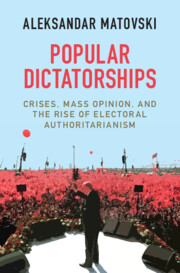Popular Dictatorships
Electoral autocracies – regimes that adopt democratic institutions but subvert them to rule as dictatorships – have become the most widespread, resilient and malignant non-democracies today. They have consistently ruled over a third of the countries in the world, including geopolitically significant states like Russia, Turkey, Venezuela, Egypt, Indonesia, Nigeria and Pakistan. Challenging conventional wisdom, Popular Dictators shows that the success of electoral authoritarianism is not due to these regimes' superior capacity to repress, bribe, brainwash and manipulate their societies into submission, but is actually a product of their genuine popular appeal in countries experiencing deep political, economic and security crises. Promising efficient, strong-armed rule tempered by popular accountability, elected strongmen attract mass support in societies traumatized by turmoil, dysfunction and injustice, allowing them to rule through the ballot box. Popular Dictators argues that this crisis legitimation strategy makes electoral authoritarianism the most significant threat to global peace and democracy.
- Accounts for a crucial omitted variable in the current accounts of electoral authoritarianism: the genuine popular appeal of these regimes in troubled societies
- Identifies a general legitimation strategy used by electoral autocracies from across the world
- Provides a framework for understanding the aggressive domestic and international behavior of electoral authoritarianism, as well as ways for oppositions to challenge them
Reviews & endorsements
‘Popular Dictators will be a definitive work on electoral authoritarian regimes and the strongmen who rule them. Aleksandar Matovski emphatically portrays mass appeal instead of elite support as the foundation of strongman power, and persuasively traces this mass appeal to the crises and conflicts that preceded strongman rule and discredited these authoritarian regimes' predecessors.' Dan Slater, University of Michigan
'Matovski’s book makes a fascinating argument – backed by impressive evidence from Russia and around the globe – that a ‘strongman appeal’ born of national crisis is often more important than actual repression in keeping authoritarian regimes stable. Engagingly written, it is bound to be an important reference point on the subject for years to come.' Henry E. Hale, Professor of Political Science and International Affairs, George Washington University
'Aleksandar Matovski has written a timely and compelling account of electoral authoritarianism – one of democracy’s greatest nemeses today. Animated by sweeping and original analysis, this book provides unique insight into how elected strongmen like Vladimir Putin maintain power by exploiting crises and the anxieties of their populations. A must read of all those interested in autocratic resilience.' Michael McFaul, Professor of Political Science, Stanford University and Former US Ambassador to Russia
'… ambitious and innovative … Matovski’s approach draws attention to the different origins of electoral authoritarianism, suggesting the relevance of a specific context (of systemic crisis) and the different preferences such context endangers in societies' Gulnaz Sharafutdinova, Perspectives on Politics
‘Matovski’s crisis legitimation paradox offers an explanation not only for why electoral authoritarian regimes tip over into full authoritarianism but also the timing in which it may occur. This insight is particularly timely in light of the dramatic rise in domestic and international aggression by Russia, the book’s primary case: Matovski’s argument implies that Russia’s invasion of Ukraine can be seen, at least in part, as an attempt to manufacture crisis in the midst of domestic ‘strongman fatigue.’ Matovski weaves a compelling story that situates the interaction of societal crises and popular appeal in the study of contemporary authoritarianism. In doing so, Popular Dictatorships makes a meaningful contribution to scholarly understanding of the rise and durability (and lack thereof) of electoral authoritarian regimes - ‘the most significant threat to global peace and democracy’’ Hannah S. Chapman, Political Science Quarterly
‘Matovski provides a full-fledged and thoroughly tested theory that is sensitive to lived experiences and acknowledges that societies might reluctantly prioritize EARs amidst violent conflicts. A refreshing step forward from the institutional narrative that dominates the research on EARs, Matovski’s theory incorporates the long-term legacies of collective hardship. This move pays off: the EAR rhetoric alone predicts whether a country is an electoral autocracy better than structural correlates of electoral authoritarianism (such as resource dependence and coercive potential of the state)-a thought-provoking-finding that underscores the oft-neglected power of narratives in regime transitions.’ Irina Soboleva, Slavic Review
Product details
February 2022Hardback
9781316517802
316 pages
234 × 158 × 22 mm
0.59kg
26 b/w illus. 8 tables
Available
Table of Contents
- 1. A 'perfect dictatorship?' The puzzle of electoral authoritarianism
- 2. Crises, popular opinion and electoral authoritarianism
- 3. Crises, popular opinion and electoral authoritarianism
- 4. The 'strongman' electoral authoritarian appeal: a comparative analysis
- 5. Crises, popular opinion and the re-alignment of political competition in Russia
- 6. Is Russia unique? The strongman heresthetic in comparative perspective
- 7. Conclusions and implications
- Bibliography
- Index.






